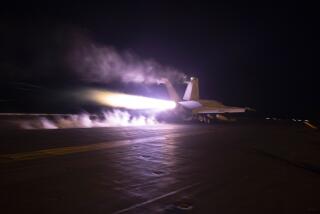Airstrikes kill 27 in Pakistan
Kabul, Afghanistan, and Peshawar, Pakistan — A pair of missile strikes hours apart killed at least 27 people Friday near the border with Afghanistan, only days after Pakistan demanded that the United States halt an intensifying campaign of using Predator drones to hit at Taliban and Al Qaeda militants.
The dead in the first attack, in Pakistan’s North Waziristan, included a mid-level Al Qaeda operative, Abdur Rehman, according to a senior Pakistani security official. Local tribesmen, however, said they were not sure that he had been killed.
The militant was known as Abu Akash al Iraqi, like many Al Qaeda figures incorporating the name of his country of origin into his nom de guerre. He was thought to have helped smuggle fighters across the border into Afghanistan and organized networks for making and planting explosives.
Residents said he had lived in the area for about three years and spoke fluent Pashtu, the language of tribes along the border. One of Abu Akash’s sons was killed in an earlier suspected U.S. strike in the same village, in November 2005.
The strikes using unmanned aircraft have come at a rapid pace since August, and have raised tensions between the United States and Pakistan, an ally in the Bush administration’s war on terrorism. Many Pakistanis believe the American attacks, which Washington rarely acknowledges, are spurring militants to carry out suicide attacks in Pakistani cities, such as the bombing in September of a five-star hotel in Islamabad, the capital.
The missile strikes are also widely viewed here as a last-ditch attempt by the outgoing Bush administration to kill a senior Al Qaeda leader before the new president takes office in January.
Some of the public anger over the missile strikes, which often kill and injure civilians as well as militants, is directed at Pakistan’s new government. The 7-month-old civilian administration is struggling to contain a burgeoning financial crisis and is urgently seeking foreign help to avoid defaulting on its debt.
Pakistan’s tribal areas are a haven for many Al Qaeda and Taliban militants, and Western military commanders say these insurgents plan and carry out attacks against U.S. and other coalition troops across the border in Afghanistan. However, the stepped-up American campaign of airstrikes has coincided with a push by the Pakistani military against insurgents, particularly in the Bajaur tribal area. That has fueled a grievance on the part of Pakistani officials that the Bush administration is being dismissive of genuine and costly efforts to hunt down insurgent leaders.
The first of Friday’s strikes hit near the town of Mir Ali in North Waziristan. Local officials said at least 24 people in Asori village were killed in the strike, which hit a vehicle and the home of a local cleric.
Two hours later, a second strike, in a village near Wana in South Waziristan, killed at least three people, according to local reports. Angry tribesmen have taken to firing at suspected U.S. drones when they hear them buzzing overhead, but the craft usually operate at too high an altitude to be in danger of being shot down.
Elsewhere in Pakistan’s troubled northwest, nine people were killed and about two dozen others injured earlier Friday when a suicide bomber struck outside the office of the police deputy inspector general in the town of Mardan. Four of the dead were police officers.
Authorities said the bomber had been trying to get inside the police compound, but a guard had stopped him for a body search.
--
--
Zulfiqar Ali reporting from peshawar, pakistan
Laura King reporting from kabul, afghanistan
More to Read
Sign up for Essential California
The most important California stories and recommendations in your inbox every morning.
You may occasionally receive promotional content from the Los Angeles Times.










